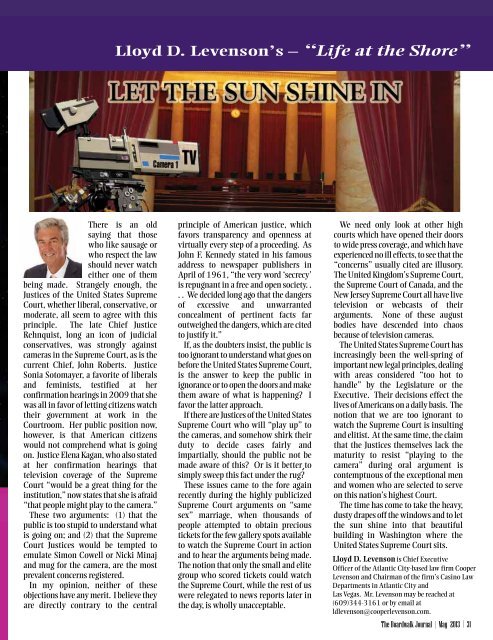THE BIGGEST MOB HIT IN YEARS
Now Available at Amazon.com, BarnesandNoble.com and wherever ...
Now Available at Amazon.com, BarnesandNoble.com and wherever ...
- No tags were found...
Create successful ePaper yourself
Turn your PDF publications into a flip-book with our unique Google optimized e-Paper software.
Lloyd D. Levenson’s – “Life at the Shore”<br />
There is an old<br />
saying that those<br />
who like sausage or<br />
who respect the law<br />
should never watch<br />
either one of them<br />
being made. Strangely enough, the<br />
Justices of the United States Supreme<br />
Court, whether liberal, conservative, or<br />
moderate, all seem to agree with this<br />
principle. The late Chief Justice<br />
Rehnquist, long an icon of judicial<br />
conservatives, was strongly against<br />
cameras in the Supreme Court, as is the<br />
current Chief, John Roberts. Justice<br />
Sonia Sotomayer, a favorite of liberals<br />
and feminists, testified at her<br />
confirmation hearings in 2009 that she<br />
was all in favor of letting citizens watch<br />
their government at work in the<br />
Courtroom. Her public position now,<br />
however, is that American citizens<br />
would not comprehend what is going<br />
on. Justice Elena Kagan, who also stated<br />
at her confirmation hearings that<br />
television coverage of the Supreme<br />
Court “would be a great thing for the<br />
institution,” now states that she is afraid<br />
“that people might play to the camera.”<br />
These two arguments: (1) that the<br />
public is too stupid to understand what<br />
is going on; and (2) that the Supreme<br />
Court Justices would be tempted to<br />
emulate Simon Cowell or Nicki Minaj<br />
and mug for the camera, are the most<br />
prevalent concerns registered.<br />
In my opinion, neither of these<br />
objections have any merit. I believe they<br />
are directly contrary to the central<br />
principle of American justice, which<br />
favors transparency and openness at<br />
virtually every step of a proceeding. As<br />
John F. Kennedy stated in his famous<br />
address to newspaper publishers in<br />
April of 1961, “the very word ‘secrecy’<br />
is repugnant in a free and open society. .<br />
. . We decided long ago that the dangers<br />
of excessive and unwarranted<br />
concealment of pertinent facts far<br />
outweighed the dangers, which are cited<br />
to justify it.”<br />
If, as the doubters insist, the public is<br />
too ignorant to understand what goes on<br />
before the United States Supreme Court,<br />
is the answer to keep the public in<br />
ignorance or to open the doors and make<br />
them aware of what is happening? I<br />
favor the latter approach.<br />
If there are Justices of the United States<br />
Supreme Court who will “play up” to<br />
the cameras, and somehow shirk their<br />
duty to decide cases fairly and<br />
impartially, should the public not be<br />
made aware of this? Or is it better to<br />
simply sweep this fact under the rug?<br />
These issues came to the fore again<br />
recently during the highly publicized<br />
Supreme Court arguments on “same<br />
sex” marriage, when thousands of<br />
people attempted to obtain precious<br />
tickets for the few gallery spots available<br />
to watch the Supreme Court in action<br />
and to hear the arguments being made.<br />
The notion that only the small and elite<br />
group who scored tickets could watch<br />
the Supreme Court, while the rest of us<br />
were relegated to news reports later in<br />
the day, is wholly unacceptable.<br />
We need only look at other high<br />
courts which have opened their doors<br />
to wide press coverage, and which have<br />
experienced no ill effects, to see that the<br />
“concerns” usually cited are illusory.<br />
The United Kingdom’s Supreme Court,<br />
the Supreme Court of Canada, and the<br />
New Jersey Supreme Court all have live<br />
television or webcasts of their<br />
arguments. None of these august<br />
bodies have descended into chaos<br />
because of television cameras.<br />
The United States Supreme Court has<br />
increasingly been the well-spring of<br />
important new legal principles, dealing<br />
with areas considered “too hot to<br />
handle” by the Legislature or the<br />
Executive. Their decisions effect the<br />
lives of Americans on a daily basis. The<br />
notion that we are too ignorant to<br />
watch the Supreme Court is insulting<br />
and elitist. At the same time, the claim<br />
that the Justices themselves lack the<br />
maturity to resist “playing to the<br />
camera” during oral argument is<br />
contemptuous of the exceptional men<br />
and women who are selected to serve<br />
on this nation’s highest Court.<br />
The time has come to take the heavy,<br />
dusty drapes off the windows and to let<br />
the sun shine into that beautiful<br />
building in Washington where the<br />
United States Supreme Court sits.<br />
Lloyd D. Levenson is Chief Executive<br />
Officer of the Atlantic City-based law firm Cooper<br />
Levenson and Chairman of the firm’s Casino Law<br />
Departments in Atlantic City and<br />
Las Vegas. Mr. Levenson may be reached at<br />
(609)344-3161 or by email at<br />
ldlevenson@cooperlevenson.com.<br />
The Boardwalk Journal | May 2013 | 31
















